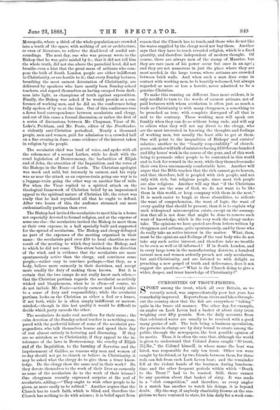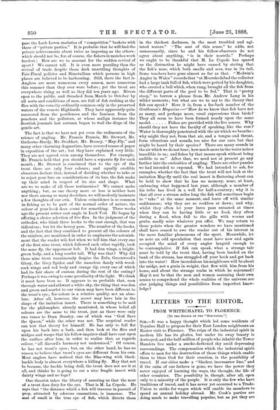CURIOSITIES OF TROUT-FISHING.
SPORT among the trout, which all over Britain, as we recently noted, was unprecedentedly poor last year, has remarkably improved. Reports from rivers and lakes through- out the country show that the fish are everywhere " taking " quite in the brave old manner. The other day, for example, an angler on Loch Leven had a basket of about sixty trout weighing over fifty pounds. Now, the daily accounts from that celebrated water are usually to be received with a good many grains of salt. The loch being a business speculation, the persons in charge are by duty bound to create among the public, through the newspapers, the best possible opinion of its merits. Thus, it is often the case that, although the world is given to understand that Colonel Jones caught "30 trout, 35i lbs.," the Colonel himself, in whose name the boat was hired, was responsible for only ten trout. Other ten were caught by his friend, or by two friends between them, for three rods can fish from each Loch Leven boat; and the remainder fell at the violent hands of the boatmen during luncheon- time and the other frequent periods within which "Death to the Trout !" had to be toasted. Still, there cannot be any question about that basket of sixty. It was made in a "club competition," and therefore, as every angler in a match has another to watch his doings, it is beyond doubt. (By-the-way, if anybody charitably frowns at the sus- picions we have ventured to state, let him daily for a week corn-
pare the Loch Leven statistics of " competition " baskets with those of "private parties." It is probable that he will find the private achievements about twice as imposing as the others : which should not be, for, of course, the fishers in matches work hardest.) How are we to account for the sudden revival of sport ? We cannot tell. It is even more puzzling than the revival of trade despite those dark unsettling thoughts of Fair-Fiscal policies and Bimetallism which persons in high places are believed to be harbouring. Still, there the fact is. Anglers are more numerous every season, more numerous this summer than they ever were before ; yet the trout are everywhere rising as well as they did ten years ago. Rivers open to the public, and thrashed from March to October by all sorts and conditions of men, are full of fish rushing at the flies with the voracity ordinarily common only in the preserved waters of the remote Highlands. They have apparently quite recovered from the pestilences and the famines, from the poachers and the polluters, at whose malign instance the Scottish journals last autumn began to wail the dirge of the gentle art.
The fact is that we have not yet even the rudiments of the science of angling. Mr. Francis Francis, Mr. Stewart, Mr. Gathorne-Hardy, Mr. Stoddart, Mr. Boosey, "May-Fly," and many other charming dogmatists, have covered reams of paper in exposition of the art ; but they have explained very little. They are not agreed even among themselves. For example, Mr. Francis held that you should have a separate fly for each month ; Mr. Stewart is convinced that to the eye of the trout there are only four colours ; and equally credible observers declare that, instead of deciding whether to take or to reject your lure on considerations of its hue, the fish make up their mind in respect of its size and shape. What are we to make of all those testimonies ? We cannot make anything ; but, as one theory more or less is neither here nor there among so many doctrines, we will modestly insinuate a few thoughts of our own. Unless coincidence is so common in fishing as to be part of the normal order of nature, the colour of your hook does count for something. Three weeks ago the present writer cast angle in Loch Voil. He began by offering a choice selection of five flies. In the judgment of the orthodox, who think three hooks to the cast enough, that was ridiculous ; but let the heresy pass. The number of the hooks, and the fact that they combined to present all the colours of the rainbow, are mentioned in order to emphasise the astonish- ment that the reader wili feel when we tell him that every one of the first nine trout, which followed each other rapidly, took the same fly, the uppermost bob. It had dun wings, a bright- green body, and a long scarlet tail. Why was that ? Why did those nine trout unanimously despise the Zulu, Greenwood's Glory, the Grey Spider, and the nameless dandy with wood- cock wings and red body and orange tip, every one of which had its fair share of custom during the rest of the outing? Perhaps it was owing to some peculiarity of the light. We think it must have been so. It appears to us probable that, seen through water and athwart a white sky, the thing that was dun and green and scarlet to our vision may have been different to the trout's eye ; for colour is a relative quality, not an abso- lute. After all, however, the secret may have lain in the shape of the imitation insect. There is something to be said for the philosopher, already mentioned, in whose belief all colours are the same to the trout, just as there were only two tunes to Dean Stanley, one of which was "God Save the Queen," while the other was not. The sceptical reader can test that theory for himself. He has only to fall flat upon his back into a bath, and then look at the flies and midges and wasps that his fellow-inquirer shall have cast upon the surface after him, in order to realise that, as regards colour, "all discord's harmony not understood." Of course, he has not trout's eyes ; but, on the other hand, he has no reason to believe that trout's eyes are different from his own. Most anglers have noticed that the Bias-wing with black- hackle body is almost everywhere a killing fly. May that not be because, the hackle being dull, the trout does not see it at all, and thinks he is going to eat a nice fragile insect with dainty wings and no legs ?
One theorist takes the liberty of assuring us that the nose of a trout does duty for the eye. That is M. La Cepede. He says that "the distance which a fish will traverse in pursuit of prey, attracted by odorous emanations, is immense. The seat of smell is the true eye of fish, which directs them
in the thickest darkness, in the most troubled and agi- tated waters." "The seat of this sense," he adds, not unnecessarily, since he and his fellow-observers do not agree about anything, "is in their nostrils." Perhaps we ought to be thankful that M. La Cepede has spared us the distraction he might have caused by stating that the fish's nose, which both smells and sees, was in its tail. Some teachers have gone almost as far as that. " Medwin's Angler in Wales" records that "at Moorshedabad the collector had a large tank full of fish, which were petted by his daughter, who erected a bell which, when rung, brought all the fish from the different parts of the pool to be fed." That is "pretty steep," to borrow a phrase from Mr. Andrew Lang in his. wilder moments ; but what are we to say to the theory that fish can speak ? Here it is, from a far-back number of the Gentleman's Magazine :—"How do we know that fish have not as many, and perhaps more, vocal expressions than birds ? They all seem to have been formed nearly upon the same model Fishes are provided with the five senses. Why should they not have the faculty of speaking, like the rest ? Water is thoroughly penetrated with the air which we breathe : why might they not, from that air, and a tongue and throat, form vibrations and sounds, too nice for our ears, but that might be heard by their species P There are many sounds in the air which we do not hear; how much more in the water noises inaudible to us; and fishes by that means speak without being audible to us." After that, we need not at present go any farther into the curiosities of angling. There are other puzzles we had intended to expound. We had intended to ask, for examples, whether the fact that the trout will not look at the imitation May-fly until the real insect is fluttering about can be held to show that he has no memory, none, at least, embracing what happened last year, although a member of his tribe has lived in a well for half-a-century ; why it is that all over a stream miles long the fish will sometimes begin to " take " at the same moment, and leave off with similar- suddenness ; why they are so reckless at dawn ; and why, whilst they often let your lures pass untasted at times: when they can be having little or no food, they often during a flood, when full to the gills with worms and grubs, madly seize whatever you offer. We may return to those points when the greater wonders we have mentioned shall have ceased to awe the reader out of his interest in the more familiar phenomena of the sport. Meanwhile, let us note an odd speculation that must have now and again occupied the mind of every angler languid enough to be contemplative. If fish can speak, what a strange tale must be told by the trout that, having been landed on the bank of the stream, has struggled off your hook and got back into the water ! How incredulous his neighbours will be about the midge, not a grain in weight, that flew with him from his home, and about the strange realm in which he sojourned !' May it not be that the men and women assuming their own senses to comprehend the whole realities of the universe are also judging things and possibilities from imperfect know- ledge?







































 Previous page
Previous page